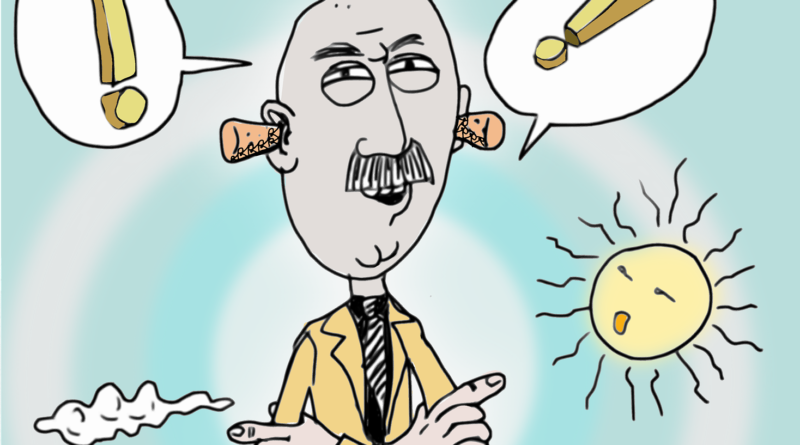Objektyvumo būtinumas vertinant faktus.
Praleidžiame vis daugiau laiko naršydami internete, randame įdomių svetainių, sužinome naujų dalykų, tačiau ar atpažįstame ir neleižiame sau pakliūti į klaidingos informacijos medijose spąstus. Reikėtų skeptiškai pažvelgi į teiginius ir suprasti, kiek tiesos juose yra.
Pirmiausia, ieškinio įrodymai turi būti įvertinti sąžiningai. Richardas Feynmanas yra pasakęs: „Svarbiausia yra tas, kad jūs neturite apgaudinėti savęs ir kad save lengviausia apgauti.”
Daugelis iš mūsų mano, kad esame objektyvūs; tai tie, kurie su mumis nesutinka, yra šališki, tiesa? Deja, kiekvienas iš mūsų yra linkęs į klaidingą mąstymą, dėl kurio galime padaryti neteisingas išvadas. Nors yra daug būdų, kaip save apgaudinėjame, dažniausiai pasitaikančios klaidos yra trys: motyvuotas samprotavimas: emociškai šališkų pateisinimų, patvirtinančių tai, kas norime, kad būtų tiesa, paieška. Antroji – patvirtinimo šališkumas: polinkis ieškoti, teikti pirmenybę ir atsiminti informaciją, kuri patvirtina mūsų įsitikinimus. Taip pat, per didelio pasitikėjimo efektas: polinkis pervertinti savo žinias ir (arba) gebėjimus.
Objektyvumas turbūt vienas sudėtingiausių dalykų, nes žmogaus smegenų gebėjimas mąstyti prilygsta tik gebėjimui apgauti save. Žinoma, specialiai neapgaudinėjame savęs. Tačiau mūsų įsitikinimai mums svarbūs; jie tampa to, kas mes esame, dalimi ir susieja mus su kitais mūsų socialinių grupių nariais. Taigi, kai susiduriame su įrodymais, keliančiais grėsmę giliai įsitvirtinusiems įsitikinimams, ypač tiems, kurie yra mūsų tapatybės ar pasaulėžiūros pagrindas, mes įsitraukiame į motyvuotus samprotavimus ir šališkumą, siekdami ieškoti įrodymų, patvirtinančių išvadą, kuria norime tikėti, ir atmesti įrodymus, kurie ne. Jei ieškote įrodymų, kad esate teisūs, juos rasite.
Objektyvumas reikalauja, kad būtume sąžiningi su savimi – todėl tai taip sunku. Problema ta, kad mes akli savo šališkumui.
Nešališkumo taisyklės pažeidimo atstovavimas yra pseudomokliškumo ir moklso neigimas, kurie abu prasideda nuo norimos išvados ir atgalinio darbo, lūkesčių bei įrodymų ieškojimas tam, jog patvirtintų tikėjimą, tuo pačiu nekreipiant dėmesio ar neatižvelgiant į įrodymus. Tačiau yra esminių skirtumų: pseudomokslas yra įsitikinimų ar praktikų rinkinys, kurie vaizduojami kaip moksliniai, bet tokie nėra. Pseudomokslinius įsitikinimus skatina noras tikėti, kad kažkas yra tiesa, ypač jei tai atitinka esamu įsitikinimus, tapatybės jausmą ar net svajones. Dėl šios priežasties įrodymų standartas yra labai žemas. Pseudomokslo pavyzdžiai yra įvairios alternatyviosios medicinos formos, kriptozoologija, daugelis Naujojo amžiaus įsitikinimų ir paranormalūs dalykai. Na o mokslo neigimas yra atsisakymas priimti nusistovėjusį mokslą. Neigimą skatina noras netikėti moksline išvada, dažnai dėl to, kad ji prieštarauja esamiems įsitikinimams. Todėl įrodymai yra neįmanomi. Pavyzdžiai apima žmogaus sukeltos klimato kaitos, evoliucijos, vakcinų saugumo ir veiksmingumo, GMO saugumo neigimą.
Abiem atvejais tikintieji yra tokie įsitikinę, kad yra teisūs, o jų troškimas apsaugoti savo puoselėjamus įsitikinimus yra toks stiprus, kad jie negali įžvelgti savo mąstymo klaidų.
Norėdami objektyviai įvertinti teiginio įrodymus, atkreipkite dėmesį į savo mąstymo procesą. Pažvelkite į visus įrodymus – ypač įrodymus, kurie prieštarauja tam, kuo norite tikėti. Jokio neigimo ar racionalizavimo. Jei įrodymai rodo, kad turėtumėte persigalvoti, turite tai padaryti.
Šia taisykle labai svarbu vadovautis kasdieniniame gyvenime, nes anksčiau minėtų pseudomokslininkų ir mokslo neigėjų pilnas internetas, ypatingai soc. tinklai. Atminkite, jei apginti savo įsitikinimus jums svarbiau nei suprasti tikrovę, greičiausiai apgausite save.
The need for objectivity in the assessment of facts.
We spend more and more time surfing the Internet, finding interesting sites, learning new things, but do we recognize and prevent ourselves from falling into the trap of false information in the media. One should look at the statements with skepticism and understand how much truth there is in them.
First, the evidence of the claim must be assessed fairly. Richard Feynman said: “The most important thing is that you must not deceive yourself, and that you are the easiest to deceive.”
Most of us think we are objective; it’s those who disagree with us who are biased, right? Unfortunately, each of us is prone to faulty thinking, which can lead to incorrect conclusions. Although there are many ways we deceive ourselves, three of the most common mistakes are: motivated reasoning: Searching for emotionally motivated justifications for what we want to be true. Second – confirmation bias: The proclivity to seek out, prioritize, and remember information that validates our beliefs. Also, overconfidence: the tendency to exaggerate one’s knowledge and/or abilities.
Objectivity is probably one of the most difficult things, because the ability of the human brain to think is only equal to the ability to deceive itself. Of course, we are not deliberately deceiving ourselves. But our beliefs matter to us; they become part of who we are and connect us to other members of our social groups. Thus, when faced with evidence that threatens deeply held beliefs, especially those that are central to our identity or worldview, we engage in reasoned reasoning and biases to seek evidence that supports the conclusion we want to believe and reject evidence that does not. If you’re looking for proof that you’re right, you’ll find it.
Objectivity requires us to be honest with ourselves – that’s why it’s so hard. The problem is that we are blind to our biases.
Representing a violation of the rule of impartiality is the denial of pseudoscholarship and science, both of which begin with a desired conclusion and work backwards, expectations, and looking for evidence to support a belief while ignoring or disregarding the evidence. However, there are significant differences: pseudoscience is a set of beliefs or practices that are presented as scientific but are not. Pseudoscientific beliefs are motivated by the desire to believe that something is true, especially if it is consistent with existing beliefs, sense of identity, or even dreams. For this reason, the standard of proof is very low. Examples of pseudoscience include various forms of alternative medicine, cryptozoology, many New Age beliefs, and the paranormal. Moreover, science denial is the refusal to accept established science. Denial is motivated by the desire to disbelieve a scientific finding, often because it contradicts existing beliefs. Therefore, proof is impossible. Examples include denial of human-caused climate change, evolution, the safety and efficacy of vaccines, and the safety of GMOs.
In both cases, believers are so convinced that they are right and their desire to protect their cherished beliefs is so strong that they cannot see the errors in their thinking.
To objectively evaluate the evidence for a claim, pay attention to your own thought process. Look at all the evidence—especially the evidence that contradicts what you want to believe. No denial or rationalization. If the evidence suggests you should change your mind, you should.
It is very important to follow this rule in everyday life, because the Internet is full of the aforementioned pseudoscientists and science deniers, especially on social media. networks. Remember, if defending your beliefs is more important to you than understanding reality, you are likely to be deceiving yourself.
foto Rilson S Avelar da Pixabay


